Back when I first compiled my RTW trip itinerary, I added Bhutan to the short list of places I was dying to visit. I’d heard it is similar to Nepal in that it offers outstanding trekking through the Himalayas, but that it’s even better because there are fewer tourists. Well, I found out why it’s less crowded… the Bhutan visa is outrageously expensive.
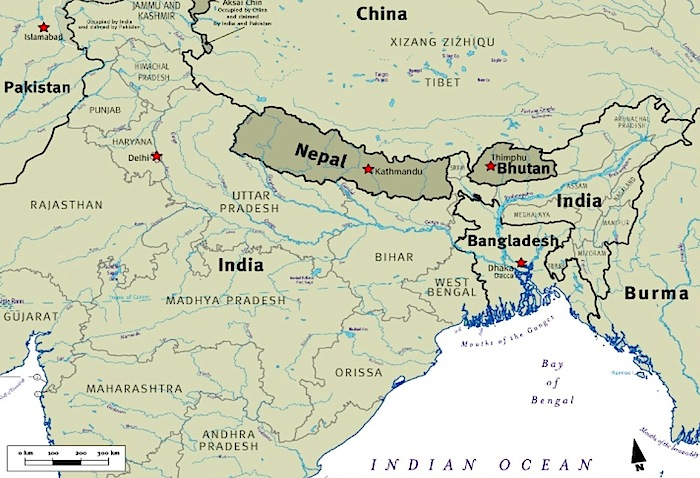
[image via]
Here’s how it works — there is a mandatory daily tourism tariff for anyone visiting the country. For groups of 3 or more, the tariff is $250 per person PER DAY in the high season (March-May, September-November) and $200 in the low season (June-August, December-February). Groups of two or fewer are subject to an additional fee — for a couple, $30 USD per person per night, and for a single person, $40 per night.
This daily tariff covers accommodation (at minimum a 3 star hotel), all meals (breakfast, lunch, dinner), a licensed tour guide for the entire stay, all internal transportation (excluding flights), camping and trekking equipment, all taxes and charges, and a royalty fee of $65. In a nutshell — you only have to pay the daily tourism tariff, and everything else is included.
Once you’ve applied for the visa through a licensed Bhutanese tourism operator (entire list available here on the official Bhutan tourism website), the Ministry of Foreign Affairs will approve the visa in about a week. They will send your visa confirmation to Druk Air, the only airline that flies in and out of Bhutan. The airline will issue tickets once your visa has been approved.
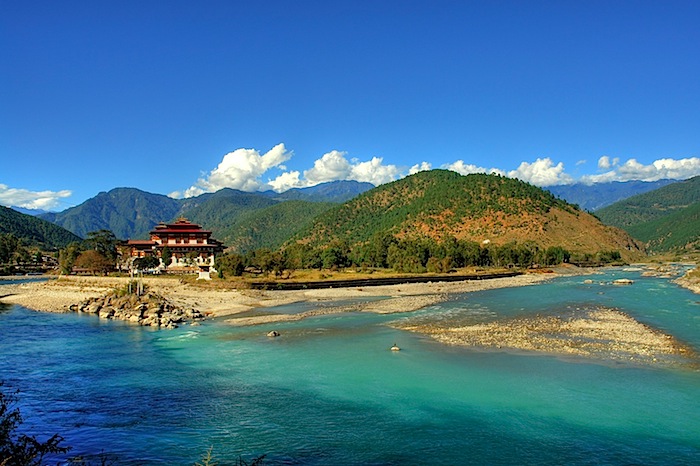
[image via]
So if you’re doing the math, it costs $290 USD per day for a single person like myself to visit this country. My budget cannot support a trip here.
Simply put — backpackers have been priced out of the Bhutan travel market.
On the plus side, Bhutan is protecting its environment by limiting the number of tourists. When I think about the number of people who trek to Everest Base Camp — according to a sign I saw there it’s 10,000 hikers every October, the most popular trekking month — and that cannot be good for long-term ecological effects on the mountain. So as badly as I want to visit Bhutan, I respect them for protecting their country from rampant tourism.
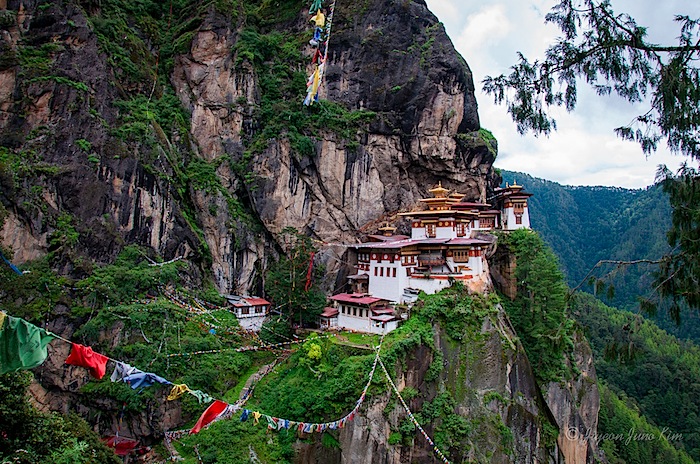
[image via]
The photos above and below feature Paro Taktsang, the Tiger’s Nest monastery near the capital city of Thimphu. It’s an iconic image that I’d seen for years without realizing exactly where it was. A monastery hanging off the side of a cliff… how on earth did they build that?! It was constructed in 1692 and is located at 10,240 feet in elevation. It takes about 5 hours to hike round-trip from the car park and there are some tough uphill stretches. There’s a cafe mid-way up the mountain for tea, a snack, or a restroom break.
If I can only do ONE thing in Bhutan, it would be this. Maybe I can fly in, hike to Tiger’s Nest, and fly out? But that’s still a minimum of two nights, and I’d have to cross my fingers for good weather. Can you imagine paying all that money to visit Bhutan only to have it pour? Too bad they don’t offer a rain check refund.
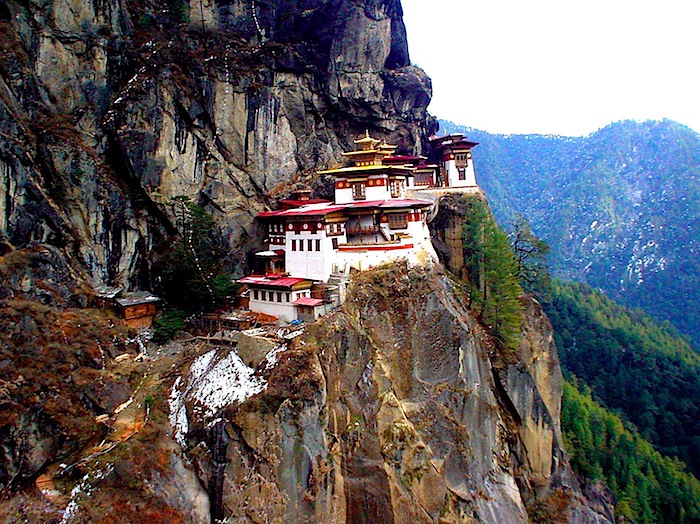
[image via]
Spellbound by images of Tiger’s Nest, I reach out to a few travel companies to request sponsorship. I beg, “Please send me on your tour free of charge and I’ll take high quality photos you can use for on-line and print marketing… pretty please?”
But no dice.
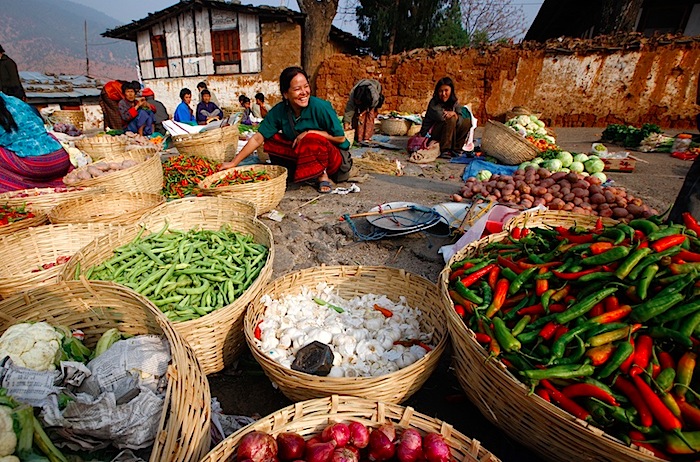
[image via]
So after hiking to Everest Base Camp, I decide to investigate Bhutan one last time. I walk into five different travel agencies in Kathmandu to ask for a quote for a quick 3-day / 2-night trip to Paro (the airport city near the capital Thimphu)… and the cheapest offer is $1,100 for the whole shebang — the daily tourism tariff plus round-trip airfare from Kathmandu. I cannot reconcile dropping that much money for three single days. After all, I spent $1,885 for nearly a full month in Nepal. If I was still employed maybe I’d splurge, but since my current job is full-time traveler, a trip to Bhutan is not in the cards. Major bummer.
A few other factors play into this decision:
- The aforementioned weather. I’d be sweating bullets about any potential storms. What a waste it would be if Tiger’s Nest was shrouded in clouds!
- Going for three days just to see a monastery — albeit a famous one — will not provide a well-rounded view of the country. Sure, I could “check Bhutan off my list,” but I’d feel like I really missed out if I didn’t trek in the mountains. I’d rather come back sometime in the future and do it right.
- If I dropped over a grand on three days of travel, I’d feel pressure to soak it all up… make the most of every minute, snap a zillion photos, dash from site to site. And that’s not my style of travel. I prefer to get to know a country slowly, observing aspects of culture unfold during a long walk through a city or by chatting with locals in a restaurant. A country reveals itself in bits and pieces, and this can’t be rushed.
- I’d feel guilty for wasting money — $1,100 would go so much further if I put it towards travel in other countries.
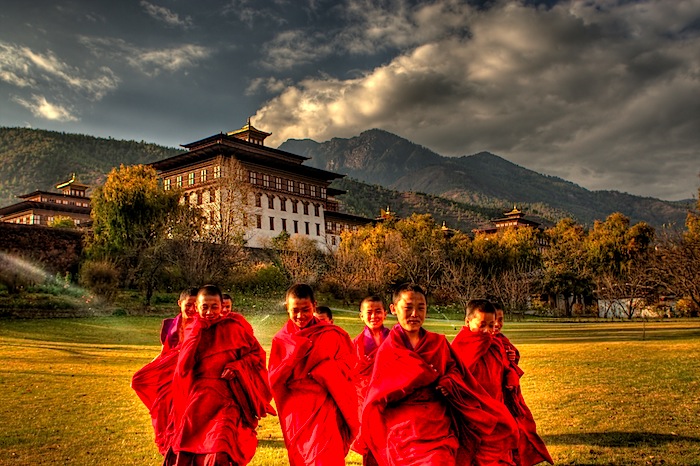
[image via]
So that leaves me wondering if there is ANY POSSIBLE WAY to avoid that daily tourist fee. You know, within the confines of the law.
And it turns out there is!
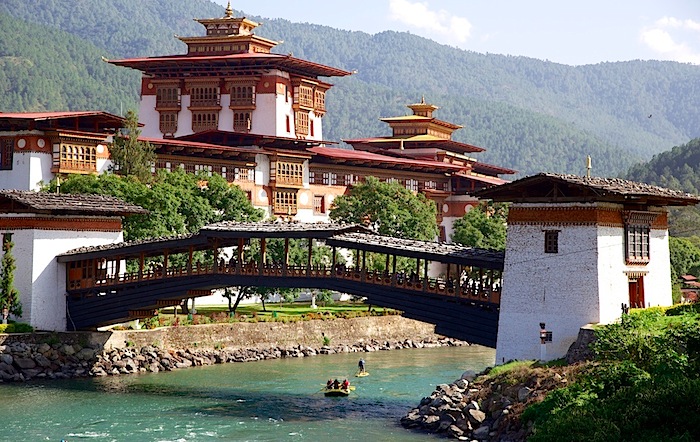
[image via]
The rules are different for volunteers. Do you have a specialized or technical skill (IT, medicine, engineering, etc.) that you can offer a local NGO in Bhutan? If so, then you’ll avoid the daily tourism fee. For example, when I was in the Cook Islands at the very start of my RTW trip, I met a couple who had volunteered as teachers over there for a few weeks. I don’t know what NGO they volunteered for, but it’s worth investigating if that skill applies to you.
And then maybe you can tack on a few days for trekking at the end of a volunteer stint?
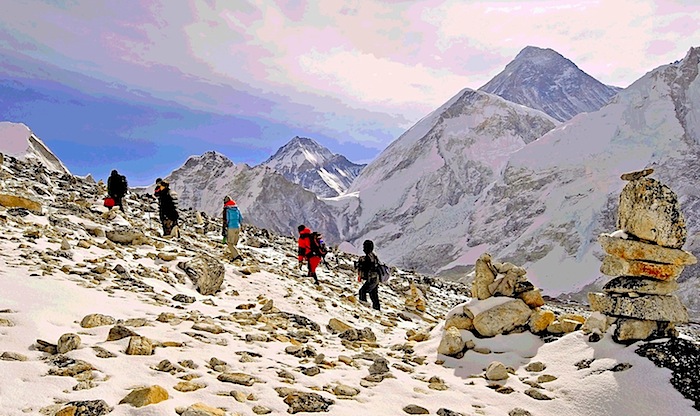
[image via]
Oh look, Bhutan even has their own swinging bridges like the ones in Nepal. These look more sturdy.
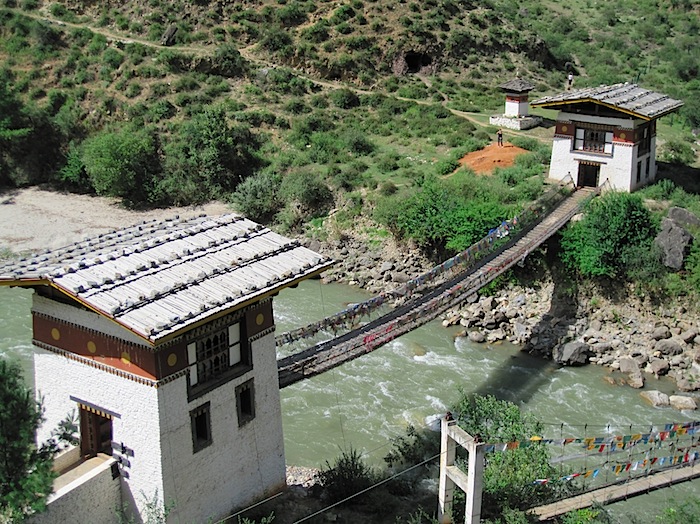
[image via]
I hope one day to return to the Himalayan region and see this dramatic and uncrowded countryside with my own eyes.
Have you been to Bhutan? If you volunteered, what NGO did you work with and would you recommend visiting the country this way? Or if you paid the daily tourism tariff, was it worth it? Were you absolutely blown away by the beauty of Bhutan?


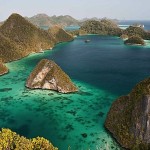

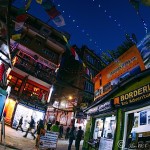


Why didn’t you consider joining a tour? My husband and I went with Geographic Expeditions in 2004 and loved it: (13 people, 17 days) but there are many other options. Afterward, when people asked, “Where do you want to go next?” I said, “Back to Bhutan”. I have been back twice.
You could also contact a Bhutanese travel agency and ask if there is a tour you could join. It is worth it.
Thank you for the tour suggestions! I checked with a few Bhutanese agencies and, unfortunately that expensive daily tourist fee applies to those traveling on tour, too (the fee is likely incorporated into the overall cost of the tour). But I do hope to get to Bhutan someday. It looks like a gorgeous country — I’m glad to hear you love it so much!
Yeah, Bhutan is ridiculously expensive. But it is definitely worth it! I joined a G Adventures tour and went there for about ten days. It was a two-week holiday and I’m working full time so I could save up the money for the trip and I don’t regret it. Make sure you go either in spring or in autumn so you won’t be caught up in rainy season.
As for volunteering, I don’t think it’s that easy. Since I work in a hospital and I loved Bhutan so much, I looked for agencies sending medical staff to Bhutan and couldn’t find any. I didn’t meet any volunteers while in the country either. I’m sure there are ways but you have to keep in mind that Bhutan is not like any other country in the world. They’re very isolated.
Hi Ilona, it’s very neat that you’ve traveled to Bhutan and found it to be such a worthwhile destination. And to spend two whole weeks there must have been fantastic! It’s been about 16 months since I wrote this post and I still hope to get there one day. Bhutan’s isolation is part of its appeal and in a way I’m glad they’ve priced out a large population of the tourism market because it protects their culture and environment. But unless the daily tourism tariff drops or I’m invited on a press trip, I suspect it will be quite some time before I get to Bhutan. I am so glad to hear that you found it worth the value. Thank you for commenting so others can see this!
Hi Erica, really enjoyed reading this. I did go to Bhutan last year October 2015 along with my hubby – it cost us $290US each a day – we’re from Australia and that equated to $394aud each per day. We are independent travellers – the float-in wander-about type who never even book the first night whatever country we’re in. We are use to travelling on less than $100a day together, so to go to Bhutan for $788aud a day was certainly a big deal for us. So was it worth it, unfortunately for us it wasn’t – far from it. Don’t get me wrong, we had an amazing experience in an incredibly beautiful country but it was peppered with constraint and conformant, being constantly watched and told where to go. We went as a couple on a private tour and I have to say, having the constant sole attention of your guide all day, every day for nearly 12hours a day is just too, too much. The DTT includes everything – accom, food, transport and although that sounds great, it kinda isn’t. You DON’T get to choose where you eat – every meal is already booked – breakfast at hotel, dinner at the hotel and lunch at tourist restaurant of their choosing – every time we asked for local restaurant we were refused. Most of the tourist hotels where you’re allowed to stay are too far from the village/towns to walk to and every time we wanted to go to the town at the end of the day our guide would constrict us to a time and then would follow us around the streets and shops. If we tried to change the day’s itinerary, we were told that tickets had already been brought, restaurant had been booked or whatever and that changing the itinerary was difficult. We found this book everything and stick to an itinerary extremely hard and sorry to say not worth the cost for us. It was actually one of the most stressful trips we’ve ever done. I know a lot people enjoy having everything organised for them so that they don’t have to worry, but not being about to chill and change caused me more stress. That said, Bhutan as country and its culture is stunning. Yes the weather is changeable, but even in the mist and drizzle, it’s beautiful. The architecture is just pure art – wether it be a house, a temple or an incredible Dzong. And the natural country side is breathtaking – pristine coursing rivers, soaring mountains, beautiful, beautiful wildflowers and birdlife yes its absolutely stunning. Does it compare to Nepal – not a all, Nepal and Bhutan in my opinion are poles apart in every way, both are incredibly amazing but neither are alike. In Bhutan we were restricted to seeing what Bhutan wanted us to see. Each time I asked my guide why we had to go to a certain place or eat bland continental food he would say this is what tourist wanted. When I questioned why there were people living in tin shanty huts on the side of the roadworks (including children) my guide wanted to deflect the question and not answer it. And a number of times at the local market, in the street and occasionally in the restaurant when I would chat to the locals, my guide wanted to know what we had talking about. I am sure my experience is not what everybody else would have, but after talking a few other visitors to Bhutan since getting back, I do not my experience isn’t totally unique either. I have to say after 16days in Bhutan, I could not wait to get back to the chaos of Nepal, their embrace of total being of who they are, not what they want you to see is a pure joy. I would never say to anyone don’t go to Bhutan, but for the first time ever I would say, if you do go, go with a larger tour group that way you may get some privacy. I can’t believe I said that, honestly! Bhutan is amazing, it’s nothing like other sub-continent countries and if I could independently travel there I would be back. But not at that cost.
Thank you so much for writing with candor and detail about your Bhutan experience! I found it fascinating to read. I think this will be so helpful for others to read as they debate traveling to Bhutan — would you mind if I share your comment in the body of this blog post? That way other will be sure to see it while scrolling. It’s so great to have the perspective of someone who has been there and experienced this particular brand of tourism first-hand.
I also wanted to mention that I just saw an interesting hour-long program on Bhutan — there’s a show on CNN called “The Wonder List with Bill Weir,” and he explored different areas of the country (happiness, natural resources, and tourism). Perhaps it’s available to watch on-line? I’d be curious to know what you think of it, if it shows Bhutan somewhat unbiasedly or if it prescribes to unofficial guidelines set forth by their tourism board.
Again, thank you so much for your comment! I loved reading it.
Hi Kez & Mal, and Erica,
I am sorry Erica for interrupting, but I would like to put forward my opinion (more like clarification) if you don’t mind. And ya I will definitely write a review on my travel to Bhutan at the end.
Well, I must say whatever Kez & Mal just said is true. BUT the way they portrayed it, I must say, is not-true. I traveled through a local tour agent in Bhutan (B.O.K Tours & Travels) and without any doubt, this was one of the best holidays that we had till date. Lemme put it in perspective,
(a) A tour guide accompanies you 9-12 hours a day – Very True. But the reason they are with you is to guide you and not the other way around or make you feel uncomfortable. They guide you. They Protect you. They are responsible for your welfare (the tourist’s welfare). Even though it is considered a safe haven, my guide Karma tole me that few tourists, due to the carelessness of the guide or themselves, met with accidents causing injuries and some deaths. But please don’t misunderstand the word carelessness. I use the word carelessness in the context that some guide fail to observe & check their guest’s health until late or fail to guide around hazardous places. From few deaths that occurred in Bhutan, cause of death varied from altitude sickness to accidents to drowning. And ya, I am sure Kez & Mal did not know that if any harm is caused to a tourist during their visit, the tourism law punishes the guide in the form of cancelling their license to the extent of imprisoning them depending on the severity of the harm caused. My guide also told me that one guide died trying to save his guest who fell in a lake. I thought it could not be true, but when I cross checked my guides talks with a room service lady & a restaurant owner, I was surprised to know that everything he said was true.
(b) You cannot visit places of your choice or eat at places of your choice – This is true, but you have a way around it. Even we thought exactly what Kez & Mal just said. We were there for 10 days. Every day was a continental meal day. We were kind of bored and wanted to try out some local street or restaurant food. So on the 7th day we decided to try out local food, to which our guide refused with an explanation saying the meal for our group had been already planned in a “tourist hotel” and they would bear loss if we not turn up. Well we did not want to be the cause of some good fellows loss or sadness. So we went as per the guides plan with a strict condition that we would want to eat outside their plan at least once in a day for the remaining time. He did not directly agree and we understood why as he was just an employee of the company. But to our surprise in the evening the Managing Head of the tour company came to visit us. We had a long talk, like I mean talk till 10 pm or so. He offered us dinner from at a local restaurant and apologized for not being able to serve us best. Thats when I felt a bit embarrassed, not in a bad way. I mean I had gone through the itinerary and the meal plans before we booked the trip. So technically it was not the tour agents fault, in fact it was mine because I was the one to check and book the trio (hope my mates don’t read this). In short, if you want to dine or brunch at local places talk clearly to your guide, if not to the company.
So, I can say it was the best trip. The landscape, the service, the people, the architecture, everything was just pristine. (By the way I forgot to mention we even had the chance to visit the local pub, obviously guided by our tour guide, bit casual in the evening from the day, and his few protective friends like our body guards. And to top it off the manager of the agency bid us farewell with a beautiful gift.)
I am off today so I can write as much as I can think. Haha.
In a nutshell, one should visit Bhutan. India, Bangkok, Nepal I find no difference in all these locations. Similar culture, locations but Bhutan was different. I know it is a bit harder for our bank accounts/pockets but who knows I might have been one of the few person to see and feel that small stupa or that strangest looking insect. More like a explorer than a traveller. And to end this review or more so to answer your question, my guide once told me when I asked him about the tariff that if you visit Bhutan with a group of certain number, the government forgoes the tariff for some number of tourist above the required number. You could form a group and travel. If you want the address of the tour agency, email me.
This is where I end. Hope you travel to Bhutan some fine day.
Thank you for the insight, Kim! I am sure people considering travel to Bhutan will find your comment helpful. I am glad you found it such a worthwhile trip.
I am actually from Bhutan and I really wish I could help you with something. many people come to Bhutan as a teacher, so that they can see the places and explore although they don’t get paid well.
I wish you could make it! all the best!
Thank you for sharing that, Anusha!
The capital of Bhutan is Thimphu. Paro is the airport city, about 52 kms from Thimphu.
Thank you so much for commenting — I just adjusted the post to reflect that Thimphu is the capital city, and Paro is the airport city!
Hi Erica,
I’m also from Bhutan. After having read your blog, i know you are very much exited to visit Bhutan like everybody else. Till date, the tourist fee is US$ 200 per person and they are likely to increase to US$ 250 next year. If you think its bit expensive for you to visit Bhutan then i would recommend you to visit Bhutan during off-seasons where the tourist fee will be little bit cheap. i hope US$200 will be worth to visit Bhutan and i promise we Bhutanese wont let you down. Welcome to Bhutan(the land of thunder dragon one day or another.
Thank you for those tips, Rinchen! I very much hope to get to Bhutan one day, and your suggestion of going in the off-season is a good one.
The Royal government of Bhutan have finalized in its parliament discussion that they are going to cut off US$.65 for every tourist visiting eastern Bhutan. This initiative was taken to have equal regional tourist visiting Dzongkhags in Bhutan. Why don’t you consider visiting Eastern Bhutan then? there are various tourist visiting sites too.
Thank you for this suggestion!